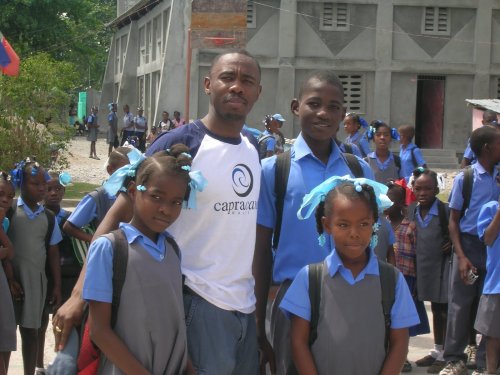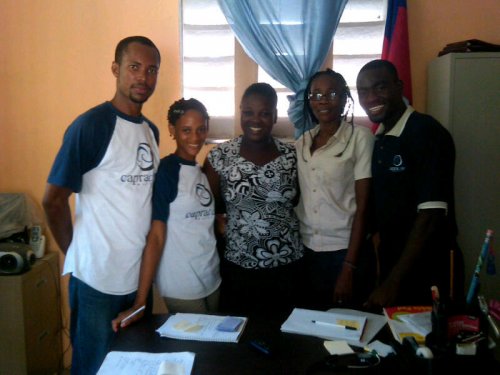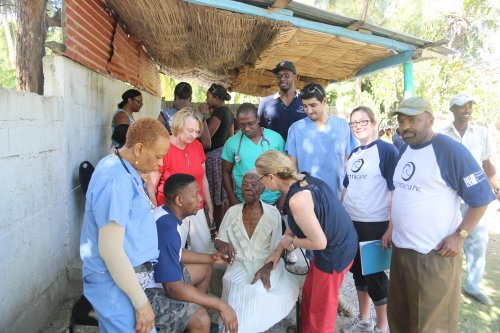CapraCare – A New Generation of Thinking and Leadership |
|
|---|---|
|
In 2011, we featured CapraCare in our “conversations” segment and we must say that this nonprofit organization has tremendously evolved since the last time we interviewed the Founder, Jean Pierre-Louis. We are amazed of their accomplishments, their strong leadership in the community of Fonfrede, and their culture that upholds team work and advanced learning to create a new generation of leaders in the community of Fonfrede. Why are we featuring CapraCare for a second time? It is an organization that is thriving with a strong foundation, like-minded individuals that say yes to change, yes to commitment and yes to making a difference. CapraCare is the sought-after community resource for the residents of Fonfrede as they envision to expanding their roots in other areas of Haiti. Their last mission trip in August 2013 led to more apparent results. Nothing is wasted in CapraCare. Every member, every team is valued for their efforts and contribution. Their mission focuses on community health, education and leadership so the people they are guiding can help themselves. The latter can make a huge and lasting impact in any community because education lasts forever. The Founder, Jean Pierre-Louis a steadfast leader, candidly takes us on a personal journey that is riveting, empowering and inspiring. His legacy as he quoted in this interview is to create a “Haitian organization that is sustainable, viable, honest that provides opportunities for jobs and enhances the quality of life for the people of Haiti.” It is a fantastic read worth of sharing with your friends, family, children, colleagues & others. The essence of this interview covers different facets as you look into the roadmap of their amazing progression since they started in 2009, their values, the meaning behind the name of CapraCare, their mission trip and certainly the visionary behind the CapraCare organization. We invite you to support their cause and their upcoming events in 2014. CapraCare is also listed under our Healthcare Education and Local/NGO sections. Inquiries about donations, volunteerism and partnerships should be addressed to info@capracare.org. Thanks to Jean Pierre-Louis for this amazing opportunity and a heart-to-heart conversation! Dahla |
Haiti1Stop: In the past 3 years, since the inception of CapraCare in 2009, how has the organization evolve as an entity? What have you accomplished with CapraCare since our last interview?
Jean Pierre: We created several key partnerships with other organizations in Haiti to ensure support and enhance the viability of the organization. Since our last interview, we have accomplished the following:
|
· CapraCare received funding support from a major Foundation to assist with transportation needs for our staff.
· CapraCare is now the clinical site for the City University of New York’s doctoral nursing program for candidates to conduct medical field services in Haiti. · CapraCare’s Community Health Workers (CHWs) are certified by the Haitian Ministry of Public Health and Population (MSPP) to provide services to their community in Haiti. · The organization has provided services to over 10,500 of our Haitians constituents. |
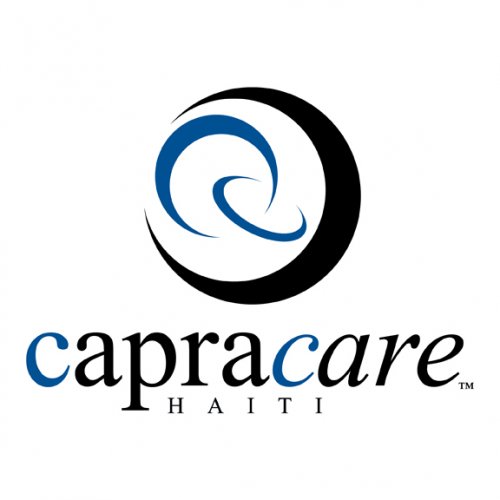 |
Haiti1Stop: How was the name “CapraCare” chosen for the organization? Is there a story behind the name?
Jean Pierre: The word “capra” comes from the word “capraesque” — evocative of the movies of Frank Capra who was an Italian-born American film director; who immigrated to the United States with his family in 1903. In his movies, he often promoted the positive social effects of individual acts of courage.
I also adopted the “capra” because my zodiac sign is Capricorn and I love the definition of the sign. I think the sign embodies who I am as a person; the Capricorn is all about hard work, ambitious, determined, practical, and extremely dedicated. I added the word, “care”, because of my compassion for people and the mission that the organization would be embarking – hence, CapraCare, with a self-definition to mean “an act of courage.”
Haiti1Stop: We want people to know more about your organization and its great work. Can you tell us what inspired you to found the organization? Is it your love for humanitarian causes? Is it your childhood connection?
Jean Pierre: I found the organization as a result of a combination of things:
|
· Discrimination of the 1990’s that Haitians were facing in New York including myself at the school playground. For example, in the 1990’s Haitians were being called boat people; non-Haitian kids teasing me and my friends in elementary school telling us that our parents were “Haitian booty scratchers” (a reference for those that work in the nursing homes or with the home elderly who are homebound). · The needs and poverty that I remember that I left back home in my community motivated me — the gross inadequacies of medical and preventive health services in Haiti. · I love the humanitarian causes but I think it’s a drive to empower the have not and put them in a position to help themselves, then we can bring about a positive change so they can help themselves. |
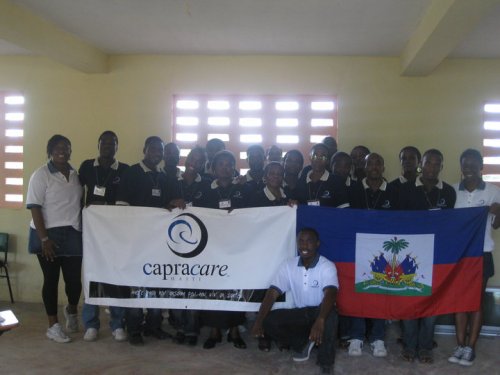 |
Haiti1Stop: In 5 words, give us a glimpse of CapraCare’s values so people can get a sense of what the organization stands for.
Jean Pierre: Passion | Purpose | Intelligence | Discipline | Dedication.
These are some of the values that we hold to build from the ground-up! Honesty plays a big part of our foundation.
The Mission Trip. The Projects
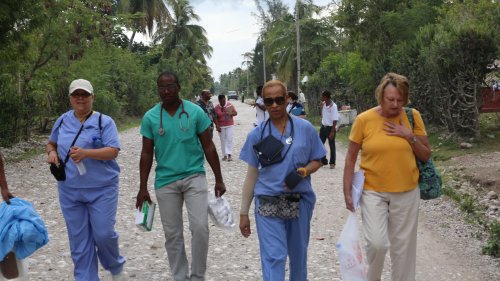 |
Haiti1Stop: Your non-profit organization takes on different projects for the betterment of the Fonfrede community. One of those projects is organizing a mission trip to Haiti at least once a year. What do you hope your volunteers will take away when participating in those mission trips?
Jean Pierre: I hope that they will be inspired to continue supporting the community of Fonfrede longer than their short-term mission. I also hope that they learned as much from the people as the people learned from them.
Haiti1Stop: Your last mission trip to Haiti took place in August 2013. a) How long did the trip last?
Jean Pierre: The mission was 1 week.
Haiti1Stop: b) What was the biggest highlight of your trip?
Jean Pierre: We conducted a complete analysis of each of our core programs and completed a few partnerships with other Les Cayes’s organizations.
Haiti1Stop: c) What was the hardest thing you faced on your trip?
Jean Pierre: The hardest thing for us was time poverty because we felt we wanted to do more but we did not have enough time. However, we were very happy that we were able to accomplish all our objectives during the trip. But more importantly, we left a core team in place to provide ongoing service to the community. And, that is always more important to us – to empower the core Haiti team to do the on the groundwork.
Haiti1Stop: d) Was there anything funny that happened during the trip that you would want to share with us?
Jean Pierre: I wouldn’t say funny. We had an amazing all team retreat where the entire organization took a day to have fun at the beach and got a chance to enjoy and get to know each other outside of the office.
Haiti1Stop: What would be the best 10 memorable things that you and your staff remember about your mission trip in Haiti?
|
|
Jean Pierre: 1. Our Caribe bus broke down in the middle of the roads at the Dominican board right before we reached the Haiti board during the Haiti relief efforts. 2. The inauguration of our office in Haiti. 3. Providing mental health support for families affected by the earthquake. 4. Providing physical therapy and mental health support to people who lost limbs during the earthquake. 5. Providing dental care services to over 100 kids in 2 days. 6. Providing medical services to over 1200 people in 5 days of work. 7. A visit from CUNY’s top executives. 8. Being in Haiti to see 20 CapraCare’s staff receive their certificates as certified community health workers. 9. Delivering the Haiti office’s first office stationery. 10. The U.S medical team conducting a physical examination on my 113 year old grandmother at the CapraCare office. |
Haiti1Stop: For people who would want to volunteer in your next mission trip, can you illustrate a typical day of a CapraCare volunteer in Haiti?
Jean Pierre:
· 8am – Breakfast
· 9am – 1pm Work
· 1pm – 2pm Lunch
· 2pm – 5pm Work
· Downtime to know the city, learn the community, eat fresh fruits or · sugarcane, etc.
· 8pm – Dinner/Super/Stargazing or just relaxing at the guest-house until bedtime around 10pm.
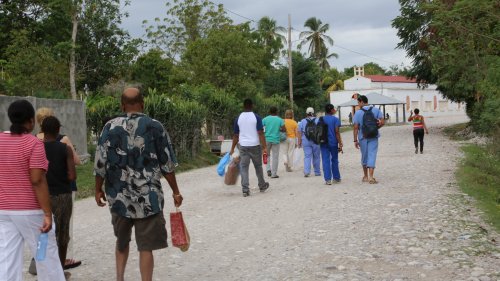 |
Haiti1Stop: Reflection is an essential element that allows anyone to look back and learned from their experiences. What do you think resonate with your volunteers in terms of learning about the community and projects on a short mission trip? Is there a connection with the people they serve in Fonfrede?
Jean Pierre: Absolutely! How hard the CapraCare Haiti staff works always amazes the U.S volunteers. They are impressed at how the people of the community are so genuine, respectful, and grateful for the help they received from the U.S staff.
Haiti1Stop: CapraCare is known to have a huge focus on mental health education and professional development. Tell us how the community in Fonfrede responded to those life skills workshops.
Jean Pierre: They are very receptive to the mental education and support group. The life skills workshops are geared towards the children. We are working on formalizing workshops for the adults.
Haiti1Stop: In our last interview, you mentioned that approximately 1500 people per year were being served by CapraCare. Has the number of people you are now serving in the community increased?
Jean Pierre: Things have drastically changed! Since our last interview in December 2011, we have served over 10,500 people in the community.
Haiti1Stop: We understand that you are hands-on on those core training workshops in Fonfrede. Can you elaborate on the types of workshops and courses being offered and how they are paving the way for a brighter future in the community?
Jean Pierre: We have workshops in the health education for the schools and larger community, life skills for the youth, and professional workshops for the staff.
Haiti1Stop: Now, that the community of Fonfrede has embraced CapraCare with open arms. Give us a glimpse of how the community has changed in terms of leadership, social/health issues and empowerment.
Jean Pierre:
· The community leaders have embraced the organization and helped us to raise awareness.
· We have created a Community Advisory Board to help direct our work and the needs of the community.
· We have created a mutual collaborative linkage with the local emergency center and CapraCare.
· Our health education and prevention workshops are well attended by the community.
Haiti1Stop: What do you consider to be the top 4 accomplishments of your last trip in Haiti if you can summarize it? And, why do you consider them essential?
Jean Pierre:
|
1. We conducted a SWOT (Strength, Weakness, Opportunity, Threat) analysis of all five core programs; we taught the staff how to also conduct the SWOT as well.
2. We implemented our sustainability plan for each core program. 3. We created two new partnerships with two larger NGO’s operating in nearby surrounding communities. 4. We are currently working on an IT database to capture all our services and outcome. |
The Founder. The Visionary. The Family man.
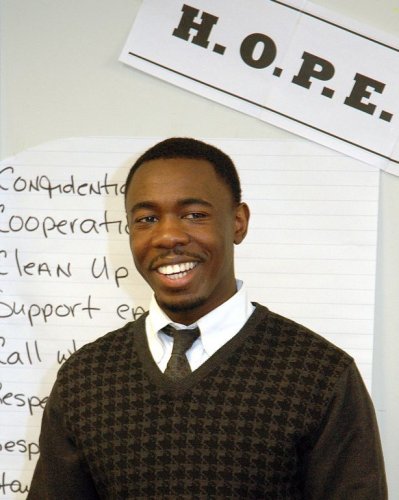 |
Haiti1Stop: Why did you choose Fonfrede as the community to be serving and not other areas of Haiti?
Jean Pierre: I was born in the community and my family has a long honest history there; my 113 year-old grandmother is still living there.
Haiti1Stop: Achieving success is a collaborative effort that most people undermine. However, you are a positive leader that embraces collaboration and we are curious to know what other types of partnerships are you looking forward to achieve?
Jean Pierre: We are looking to collaborate with more organizations that are focused on global health, and to collaborate with universities seeking to have their students do field work for their internships, masters paper, dissertations, research, etc.
Haiti1Stop: Every organization has a board, team members & leaders that contribute to its success. In 3 words, how would you describe the behind scenes atmosphere of a team meeting?
Jean Pierre: Participatory | Engaging | Lively
Haiti1Stop: A great leader must carry different hats and be accepting by the people they serve. You are such an approachable person, how would you describe your style of leadership?
Jean Pierre: I’m team oriented to accomplish goals; easy going; work first, play later. However, I am not afraid to take on a task alone to get it done. I keep a good balance of when to be democratic and when to be autonomous in my approach.
Haiti1Stop: What would be the best advice would you give to someone who’s looking up to you and want to follow your steps?
Jean Pierre: You must have heart, courage, and be relentless at pursing your mission; always look for small victories; otherwise, you will not last.
Haiti1Stop: You are a family man who is passionate about your work and organization. Doing what you do can become exhausting and not everyone has your type of drive, your determination. How do you balance work and family life? And, where do you get your source of energy?
Jean Pierre: I am very lucky to have a very supportive family that understands the sacrifices that my work takes in order for those who are less fortunate to have a chance or hope for a better future in Haiti.
To support my health, I go to the gym very early in the morning for four days a week. My motivation is that I am obligated to give back to my community because I represent them.
Haiti1Stop: Preparing for a mission trip requires great team, great leadership and good standing strategic planning among the many. Can you tell us what has been different about preparing for the 2013 trip compared to the previous one?
Jean Pierre: Our February 2013 trip required a lot more coordinating, organizing, and preparing because our group was much bigger than usual. We were organizing a medical mission which would also include mental health training and research. The team included the following people: High level City of University of New York executives, City University of New York Doctoral Nursing’s students, Nurse practitioners, Mental health professionals.
Haiti1Stop: Give us your best life quote that summarizes your challenges, triumphs and expectations?
Jean Pierre: It’s not how you Start, it’s how you Finish!
Haiti1Stop: As a non-profit organization, it is the norm to hold fundraising events. What future events should we look forward to this end of the year and in 2014?
Jean Pierre: We will host 2 major events in 2014:
|
1. CapraCare’s 4th annual “Show Your Love for Haiti,” to commemorate the Haiti earthquake of 2010.
2. The 5th anniversary celebration for CapraCare which will be held sometimes in June 2014. |
 |
Haiti1Stop: Are there projects in the works for CapraCare that you wish to announce to our audience?
Jean Pierre: As of right now, we will look to do another medical mission and a very intensive train-the-trainer with our core trainers in Haiti.
We will also be focusing on applying for grants to get some our current projects funded.
Haiti1Stop: Have you ever thought of opening a CapraCare clinic in Fonfrede?
Jean Pierre: We now actually have a clinic in Fonfrede. We are able to provide both medical services and medication to folks.
Haiti1Stop: What is the legacy you wish to leave with CapraCare?
Jean Pierre: That I was able to create a Haitian organization that is sustainable, viable, and honest; to provide opportunities for jobs, and enhance the quality of life for the people of Haiti.
Haiti1Stop: With the Haitian Government’s efforts to promote tourism in Haiti, what insights do you have on the subject? And, would you be open to organize an ecotourism tour as part of CapraCare’s future mission trip so people can discover more about Fonfrede’s livelihood.
Jean Pierre: I am fully aware of the tourism efforts in parts of the country especially in Jacmel. Earlier this year, I was in a conference where the Prime Minister of Haiti, Laurent Lamothe, highlighted some efforts but they still have much more ways to go before seeing a profit on their returns. I have a friend that takes college students during spring break to Haiti and that has been a good draw every year.
These are the top 15 places someone suggests to visit in Haiti that I know:
1. Jacmel
2. Labadee
3. Petion-Ville
4. Kenscoff
5. Champs-de-Mars (National Museum)
6. Port Salut
7. Gelee
8. Lake Azuei
9. Mole Saint-Nicolas
10. Bassin Bleu
11. Jeremie
12. Saut D’eau
13. Ile-a-Vache
14. Forest-des-Pins
15. Belle Anse
Fonfrede has a very nice history and is the birthplace of President Antoine Simon. He was Haiti’s President from 1908-1911.
Haiti1Stop: For anyone interested in supporting CapraCare’s projects in Haiti, what should they do? How can they contact you?
Jean Pierre: They can visit our website at www.capracare.org/get-involved or contact me directly at JeanPierreLouis@capracare.org . I also can be reached at (478) 227-7209
